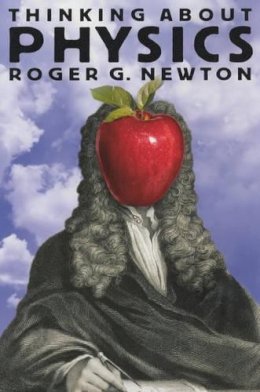
Stock image for illustration purposes only - book cover, edition or condition may vary.
Thinking About Physics
Roger G. Newton
€ 56.38
FREE Delivery in Ireland
Description for Thinking About Physics
Paperback. Covers topics such as quantum mechanics, classical mechanics, field theory, thermodynamics, the role of mathematics in physics, and the concepts of probability and causality. This book is intended for advanced undergraduate students, professors, and researchers. Num Pages: 208 pages, 9 line illus. BIC Classification: PH. Category: (P) Professional & Vocational; (U) Tertiary Education (US: College). Dimension: 232 x 155 x 13. Weight in Grams: 304.
Physical scientists are problem solvers. They are comfortable "doing" science: they find problems, solve them, and explain their solutions. Roger Newton believes that his fellow physicists might be too comfortable with their roles as solvers of problems. He argues that physicists should spend more time thinking about physics. If they did, he believes, they would become even more skilled at solving problems and "doing" science. As Newton points out in this thought-provoking book, problem solving is always influenced by the theoretical assumptions of the problem solver. Too often, though, he believes, physicists haven't subjected their assumptions to thorough scrutiny. Newton's goal is to provide a framework within which the fundamental theories of modern physics can be explored, interpreted, and understood. "Surely physics is more than a collection of experimental results, assembled to satisfy the curiosity of appreciative experts," Newton writes. Physics, according to Newton, has moved beyond the describing and naming of curious phenomena, which is the goal of some other branches of science. Physicists have spent a great part of the twentieth century searching for explanations of experimental findings. Newton agrees that experimental facts are vital to the study of physics, but only because they lead to the development of a theory that can explain them. Facts, he argues, should undergird theory. Newton's explanatory sweep is both broad and deep. He covers such topics as quantum mechanics, classical mechanics, field theory, thermodynamics, the role of mathematics in physics, and the concepts of probability and causality. For Newton the fundamental entity in quantum theory is the field, from which physicists can explain the particle-like and wave-like properties that are observed in experiments. He grounds his explanations in the quantum field. Although this is not designed as a stand-alone textbook, it is essential reading for advanced undergraduate students, graduate students, professors, and researchers. This is a clear, concise, up-to-date book about the concepts and theories that underlie the study of contemporary physics. Readers will find that they will become better-informed physicists and, therefore, better thinkers and problem solvers too.
Product Details
Publisher
Princeton University Press United States
Number of pages
210
Format
Paperback
Publication date
2002
Condition
New
Number of Pages
208
Place of Publication
New Jersey, United States
ISBN
9780691095530
SKU
V9780691095530
Shipping Time
Usually ships in 7 to 11 working days
Ref
99-1
About Roger G. Newton
Roger G. Newton is Distinguished Professor Emeritus at Indiana University. He is editor of the Journal of Mathematical Physics and author of several books, including Scattering Theory of Waves and Particles, The Truth of Science, and What Makes Nature Tick?
Reviews for Thinking About Physics
"In Thinking About Physics, a fast-paced and challenging collection of essays, Newton appears as an opinionated yet approachable discussion leader... Newton cuts a wide swath and sprinkles his analysis with provocations that make it hard to be a passive reader."
Chris Quigg, Science "In brief, this book is a history of theoretical physics but is not lacking in interpretation of experimental results... [It] will interest anyone who wants to understand the basic concepts of physics."
Choice "Presents the essence of a great deal of modern physical theory in both a condensed and leisurely digestible form."
H. Rechenberg, European Journal of Physics
Chris Quigg, Science "In brief, this book is a history of theoretical physics but is not lacking in interpretation of experimental results... [It] will interest anyone who wants to understand the basic concepts of physics."
Choice "Presents the essence of a great deal of modern physical theory in both a condensed and leisurely digestible form."
H. Rechenberg, European Journal of Physics
